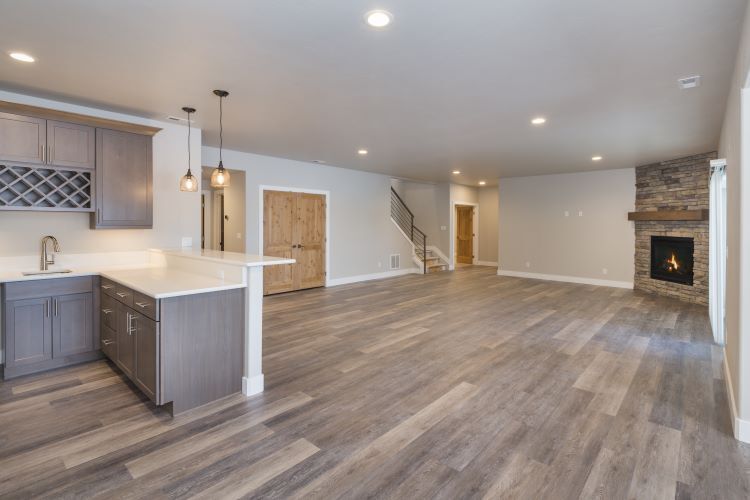The Post-Demolition Considerations

Demolition is a critical step in many renovation projects, particularly when transforming a basement. However, the work doesn’t end once the last wall has been brought down. Post-demolition considerations are crucial for ensuring a successful renovation. At Basement Renovations London, we understand the importance of thorough planning and preparation before moving on to the next phase. Here’s a guide to help you navigate the essential post-demolition steps.
1. Debris Removal and Site Cleanup
After demolition, the first priority is clearing the site of debris:
- Hire a Professional Cleanup Crew: Professional services ensure that all debris, including hazardous materials, is removed safely and efficiently.
- Recycle and Dispose Responsibly: Separate materials that can be recycled, such as metal and concrete, from those that need to be disposed of properly. Responsible disposal helps minimize environmental impact.
- Final Sweep: Conduct a final sweep of the area to ensure all small debris, nails, and dust are removed, leaving the site clean and safe for the next phase.
2. Structural Assessment
With the demolition complete, it's crucial to assess the remaining structure:
- Inspect Remaining Walls and Foundation: Check for any signs of damage or instability in the walls and foundation that were not removed.
- Consult with a Structural Engineer: A professional engineer can provide a detailed assessment of the structural integrity, ensuring that the remaining framework is sound and safe.
- Repair and Reinforce as Needed: Address any issues identified during the assessment. Reinforcing the foundation or remaining walls may be necessary to support the new construction.
3. Utility Checks
Ensure that all utilities are in good working order and properly located:
- Plumbing: Inspect pipes for any damage or leaks. Ensure that new plumbing lines are accurately placed according to the renovation plans.
- Electrical: Check all wiring and circuits. Plan for new electrical outlets, lighting, and any other electrical needs for the renovated space.
- HVAC: Assess the heating, ventilation, and air conditioning systems. Make sure they are capable of supporting the new layout and that any necessary adjustments are made.
4. Permits and Compliance
Ensuring compliance with local regulations and building codes is essential:
- Review Permits: Confirm that all required permits for the renovation are in place. This may include permits for electrical, plumbing, and structural work.
- Building Codes: Make sure the planned renovations adhere to local building codes. This can prevent costly delays and legal issues later in the project.
- Inspections: Schedule necessary inspections at various stages of the renovation to ensure compliance and safety.
5. Plan for Moisture and Waterproofing
Basements are prone to moisture issues, so proper waterproofing is crucial:
- Inspect for Water Damage: Check for signs of water intrusion, such as damp spots, mold, or mildew.
- Waterproofing Solutions: Apply waterproofing treatments to walls and floors. This may include sealants, membranes, or drainage systems.
- Sump Pump Installation: If your basement is susceptible to flooding, consider installing a sump pump to protect against water damage.
6. Prepare for Renovation
With the demolition site cleared, assessed, and prepped, it’s time to prepare for the renovation:
- Design and Layout: Finalize the design and layout plans. This includes the placement of walls, rooms, and features such as bathrooms or kitchens.
- Material Selection: Choose high-quality materials that fit within your budget and meet your aesthetic and functional needs.
- Budget Review: Reassess your budget to account for any unexpected costs incurred during demolition and initial preparations.
7. Safety Considerations
Maintaining a safe work environment is paramount:
- Safety Gear: Ensure that all workers have access to necessary safety gear, including helmets, gloves, and masks.
- Clear Communication: Maintain clear and consistent communication with your renovation team to address any safety concerns promptly.
- Access Control: Restrict access to the worksite to authorized personnel only, to prevent accidents and ensure site security.
Conclusion
The post-demolition phase is a critical part of any renovation project. By addressing these considerations, you can ensure that your basement renovation proceeds smoothly and safely. At Basement Renovations London, we are committed to providing expert guidance and services to help you transform your basement into a beautiful and functional space.
Contact Basement Renovations London today to learn more about our comprehensive renovation services and how we can assist you in achieving your dream basement.
Basement Renovations London is your local expert for all basement renovation needs in London, Ontario. From demolition to finishing, we are dedicated to delivering high-quality results on every project. Visit our website or call us for more details.
You might also like




